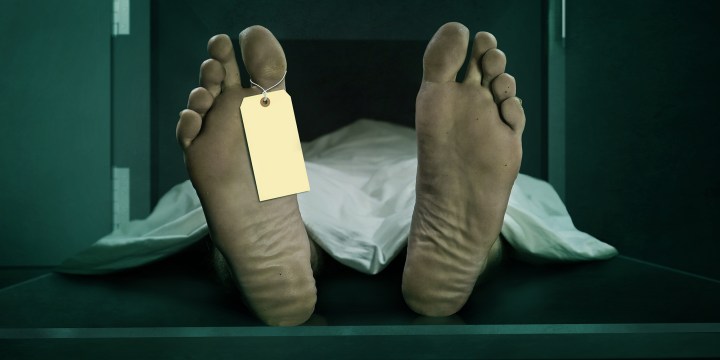MORTAL REMAINS
Gauteng implements digital fingerprint system to ID unclaimed bodies in morgues

Unclaimed bodies are putting a strain on forensic pathology services and the increase in load shedding exacerbates the problem. Gauteng has introduced a digital fingerprint system to identify unclaimed corpses.
Public hospitals and forensic pathology mortuaries have been burdened by unclaimed corpses. Health Minister Dr Joe Phaahla recently brought attention to the issue when responding to written questions in Parliament.
Phaahla was asked what measures his department was taking to “ensure that such facilities are not burdened and overpopulated with unclaimed corpses” while “corpses are now decomposing at a faster rate due to load shedding”.
“The public hospitals and forensic pathology mortuaries have continuous backup generator capacity. This helps mitigate the potential of mortal remains decomposing,” Phaahla replied.
“There are continuous discussions with Eskom to exempt public hospitals and forensic pathology mortuaries from load shedding. Most of the decomposed bodies are received by forensic pathology mortuaries, mostly due to these bodies being discovered in public spaces after a long time,” he said.
To reduce the burden on healthcare facilities, Phaahla said the health department had implemented measures aimed at tracing the families of the dead and ensuring these facilities were not overwhelmed.
Read more in Daily Maverick: Unidentified bodies in mortuaries: How the Gauteng Health Department’s plans and promises are falling short
A joint initiative is in progress to address the issue of unclaimed bodies, focusing on family tracing.
Measures include contacting the next-of-kin if addresses are available, using social workers, community development and healthcare workers to trace families, and publishing details and photos of unclaimed corpses through public media outlets.
The South African Police Service is leading the effort. The Department of Health is working with the departments of home affairs and social development, and municipalities, to provide paupers’ burials in instances where families cannot be located.
Only after exhaustive attempts are made does the Department of Health apply for a pauper’s burial.
‘One grave, three bodies’
Lebo Mashigo, whose family has a funeral home in Mpumalanga, explained how pauper’s burials are, at times, conducted.
“Sometimes three bodies can be fitted in one grave, simply because if you put them side by side, it’s a lot of space, one grave, three bodies, sometimes even up to four,” she said.
“The municipality appoints an undertaker, they don’t do a proper funeral, they just get the cheapest coffin and put the bodies in, bury them and keep records of the grave site where they are buried for future reference.”
Susan Brice, a cemetery coordinator at the City of Cape Town, told Daily Maverick that unclaimed corpses at the city’s mortuaries “has been a problem for a long time, and I feel like we [the City of Cape Town] are more affected than most places.”
Innovation in identification
Gauteng Premier Panyaza Lesufi, with the MEC for health and wellness, Nomantu Nkomo-Ralehoko, recently unveiled a digital fingerprint system to identify bodies in the province’s 11 Forensic Pathology Service mortuaries.
The system was launched in collaboration with the Centre for Public Service Innovation and the Council for Scientific and Industrial Research. It matches fingerprints to Home Affairs, SAPS and National Credit Bureau databases to identify bodies.
The successful pilot of the digital fingerprint system at five Gauteng mortuaries (Bronkhorstspruit, Johannesburg, Diepkloof, Pretoria and Ga-Rankuwa) in January paved the way for its province-wide implementation.
Nkomo-Ralehoko said the introduction of the system was a transformative milestone in forensic pathology.
“This innovative technology will improve the quality of fingerprints collected from the deceased, resulting in an improved identification rate which, in turn, will lead to the tracing of families of known unclaimed bodies,” she said.
Nkomo-Ralehoko said 150 bodies in the 11 mortuaries had been identified using fingerprints sent to the police. DM





















 Become an Insider
Become an Insider
Comments - Please login in order to comment.